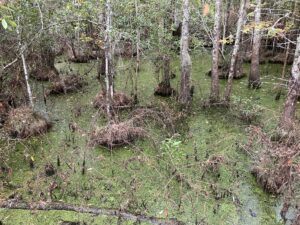 I head south from Virginia Beach, down the Outer Banks through Kitty Hawk and Nags Head, across Roanoke Island where an early colony of Europeans was somehow lost. I zig-zag through the North Carolina lowlands, skipping over and around ocean inlets crossed with lines of crab pot buoys, and languid rivers that lost their gumption 100 miles to the west in the nearest hills. As if being force-fed irony and stereotype, the first Confederate flag I have seen in two weeks hangs limply off the front step of a dilapidated single-wide in a small park of similarly worn-out trailers. Amongst the fields of yellowing soybeans and harvested corn it is impossible to ignore the depth, pain, and velocity of human history captured by a cotton field waiting to be picked, butted up against a hundred-acre solar farm.
I head south from Virginia Beach, down the Outer Banks through Kitty Hawk and Nags Head, across Roanoke Island where an early colony of Europeans was somehow lost. I zig-zag through the North Carolina lowlands, skipping over and around ocean inlets crossed with lines of crab pot buoys, and languid rivers that lost their gumption 100 miles to the west in the nearest hills. As if being force-fed irony and stereotype, the first Confederate flag I have seen in two weeks hangs limply off the front step of a dilapidated single-wide in a small park of similarly worn-out trailers. Amongst the fields of yellowing soybeans and harvested corn it is impossible to ignore the depth, pain, and velocity of human history captured by a cotton field waiting to be picked, butted up against a hundred-acre solar farm.
Large poultry farms and processing plants are discreetly tucked back behind pine tree wind-breaks, but the bilingual signs and more-than-you-would-expect Mexican restaurants in small towns don’t lie. Migrants have been the labor backbone of America for 200 years. Most Americans just don’t want to do the hardest, dirtiest work that our parents and grandparents did back when they were recent to these shores.
There must be an informal agreement here to never tear down old wood houses, sheds, barns, and shacks, leaving them to sink back into the earth from the weight of collapsed roofs, punctured walls, and climbing vines. They tell the disappearing story of life here a generation or two ago, before plumbing, air conditioning, bricks, and carports. And, once again, as I travel this late summer and fall I believe there surely must be a Eleventh Commandment subscribed to by rural Americans in which God told Moses, “No matter how much lawn and no matter how modest your home, thou shalt keep the grass neat and mowed.”












Leave A Comment